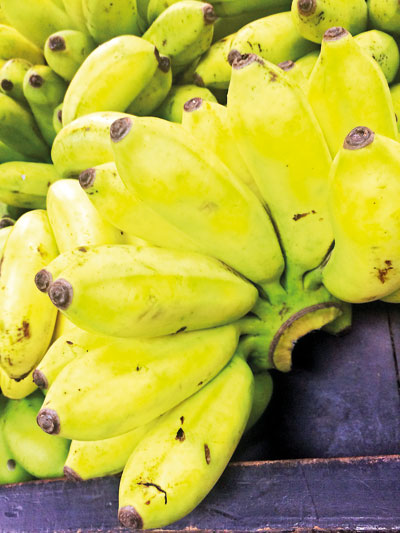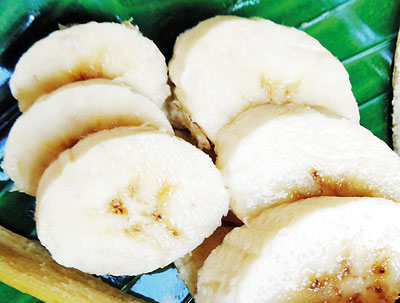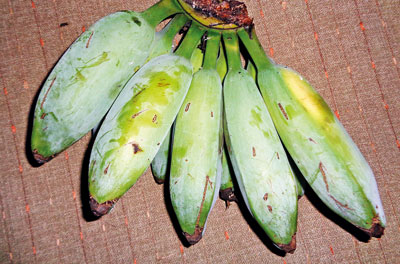View(s):
By Dr. Nirmala M. Pieris
We all know the expression ‘Go bananas’ a term usually used when we are extremely excited due to pleasure, anger or even surprise, but it has nothing to do with bananas. However, the banana for sure is something to be really thrilled about, well known as an energizer providing a considerable spurt of energy that is sustained. Bananas (kehel in Sinhala and valai palam in Tamil) that belong to the genus Musa in the family Musaceae are berries that are simple fruits. Bananas do not grow on trees; the apparent above ground ‘stem’ is composed of tightly packed leaf sheaths. The stem bears one inflorescence that matures into one cluster of fruits that may contain up to 300 bananas with individual fruits grouped into bunches.

Banana: The sweeter variety
Each banana comes with its own wrapper that can vary from thin to rather thick with all being 100% compostable making them a great natural fertilizer. The flesh that is slightly sour or sweetish with most having a pleasant aroma when ripe can vary from ivory to creamy white to pale to straw yellow with the texture being soft, buttery or marrow-like hiding within it several minute seeds.
Bananas grow freely all over Sri Lanka, in orchards as well as in home gardens and are harvested all year round, so they are never out of season. It is interesting to note that there is a technical difference between a “banana” and a “plantain” although, we in Sri Lanka use the terms interchangeably. The ‘dessert variety’ or the sweet banana is scientifically Musa sapientum, while the plantain, Musa paradisiaca is the “cooking variety” that is starchier and lower in sugar.
In Sri Lanka, about 29 banana cultivars and two wild species have been reported. Five are cooking types and the rest except the wild species are dessert types. The sweet bananas vary in size and colour and are grouped into three broad categories: the Mysore, Kolikuttu and Cavendish. In the first category are the ambul and seeni kehel that are smaller and thinner than the other varieties with the peel turning yellow when ripe. The Kolikuttu category includes the kolikuttu, suwendel, puwalu and rath kehel. These are a little larger and plumper than the first category and have a yellow peel when ripe other than the rath kehel which has a red peel.
Some of the common types in the Cavendish are the anamalu, ambun, bin kehel and nethrampalam. These are much larger and longer than the first two types and have a lemon yellow to green peel when ripe with the nethrampalam being the largest and the longest of the bananas. The most popular cooking variety is the well-known alu kehel which has a green peel even when ripe.
When you are buying bananas, always select the plump ones with evenly coloured light green to yellow skins. They will ripen at room temperature and should be eaten as soon as possible before the flesh turns mushy. Bananas are delicious as they are but are also good with cereal, in fruit salads, smoothies and shakes, with ice cream and yoghurt or even in a peanut butter sandwich. Soft, overripe bananas are best for mashing and using in breads, muffins, cookies, croissants and also in crepes and pancakes.
Bananas, when baked, caramelized or as fritters with a dollop of cream or sprinkling of brown sugar or honey are delicious.
If you are prone to hangovers, a good cure is a banana milkshake. Once peeled, use bananas immediately as they darken when exposed to air. You can sprinkle some lemon or lime juice to prevent discoloration. Plantains are used more like vegetables to make curry, chips or even in soups. The plantain peel tempered with some sprats is delicious.
Nutritional benefits
Bananas are a good source of vitamin B6 and a good provider of potassium, manganese, magnesium, vitamin C and dietary fibre. They are also a rich source of carbohydrates, mainly starch in unripe bananas that is converted to sugars on ripening. A high proportion of the starch is resistant starch, which, as the name suggests, is resistant to digestion and is therefore a type of fibre. Bananas also contain pectin especially when not too ripe.
Boosts energy and prevents muscle fatigue
Banana contains three natural sugars, sucrose, fructose and glucose, which combined with fibre give you long-lasting energy and are considered as nature’s energy bars. The potassium in the fruit helps keep you alert and prevents muscle fatigue.
Controls high blood pressure and supports heart health
Potassium in banana is useful in preventing high blood pressure and decreases the risks of heart disease and strokes because it regulates circulation, sodium, and water retention within the body. It also contains magnesium, a nutrient essential for heart health.
Reduces stress, anxiety and depression
Bananas contain tryptophan and vitamin B6 that facilitates the regulation of serotonin, one of our main “happy hormones”. Tryptophan also helps to relieve depression and anxiety and induce sleepiness.
 Keeps blood sugar levels steady
Keeps blood sugar levels steady
Vitamin B6 in bananas helps even out blood sugar levels helping you to avoid blood-glucose highs and lows. Both pectin and resistant starch moderate the rise in blood sugar after a meal.
Enhances digestive health
The cooking plantains contain resistant starch and pectin, which support the growth of beneficial gut bacteria and thus promotes colon health. The fibre in bananas helps prevent constipation, bloating, and other digestive problems.
Improves kidney health
As a good dietary source of potassium, bananas may be especially beneficial for maintaining healthy kidneys.
Helps weight loss
Bananas being low in calories and rich in fibre helps you feel full for long periods and is thus linked with low body weight and weight loss.
Improves brain and skin health
The manganese and vitamin C in bananas act as antioxidants and aid in collagen production to keep you looking young. Manganese also helps with healthy brain function.
So there you are, bananas, a healthy, versatile and delicious fruit. But do keep in mind that if you are a diabetic, you should avoid eating a lot of the well ripened fruit.

Plantain: The cooking variety


